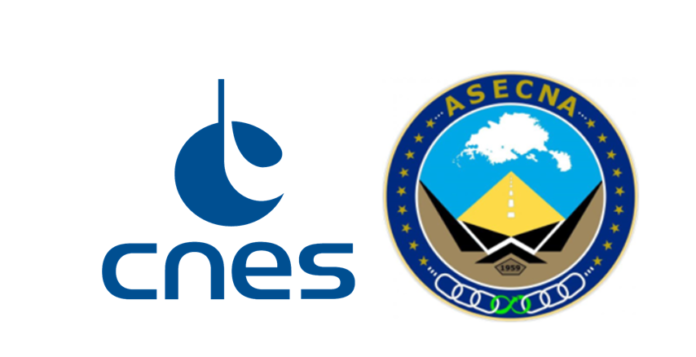Mohamed Moussa, Director General of the Agency for the Safety for Air Navigation in Africa and Madagascar (ASECNA) and Philippe Baptiste, Chairman & CEO of the French space agency CNES (Centre National d’Etudes Spatiales)have signed a new agreement to develop, deploy and commission ASECNA’s Satellite-Based Augmentation System (SBAS).
The seven-year agreement sets out the terms and provisions for providing management assistance in systems engineering for the ground segment, the space segment and system performance.
CNES has been working with ASECNA to design its SBAS since 2011, notably on research and development to improve ionospheric disturbance processing algorithms. From 2017 to 2021, CNES assisted ASECNA with managing the system definition and design phase. This phase also demonstrated with accurate test signals in 2020 and 2021 the adequacy of technical choices and the quality of services targeted for the expected service area while conducting field demonstrations to promote the system’s benefits to users.
Similar to the European Geostationary Navigation Overlay System (EGNOS), this SBAS is set to provide a Safety-of-Life service enabling reliable use of GPS signals for air navigation during all stages of flight from the en-route phase to landing. As a result, it will enhance flight safety and efficiency while reducing their environmental impact.
Furthermore, the system will offer an Open Service with greater accuracy than Global Navigation Satellite Systems (GNSS), which is expected to mirror EGNOS (0.5 metres). It will be the first operational SBAS in Africa. Its services will be in line with the standards and practices of the International Civil Aviation Organization (ICAO) and compatible with SBAS avionics already operated by commercial airlines.
Besides the political and operational stakes for ASECNA of securing its means for improving air traffic management and making it safer, this SBAS will be meeting a significant technical challenge. It will be the first system of its kind to be operated in an equatorial region and, therefore, the first SBAS in the world to provide such a service despite the strongest ionospheric disturbances around the equator.
Therefore, using Galileo satellites and GPS will enable more measurements of the ionosphere, which is crucial to resolving this issue. This implementation of SBAS in Africa, affording a common capability developed by a large number of countries, marks a further step towards the construction of a single sky for managing the continent’s air traffic, thereby supporting the Single African Air Transport Market (SAATM) and the African Union Agenda 2063.






